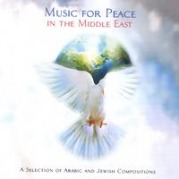Music for Peace in the Middle East
SKU:
$10.00
$10.00
Unavailable
per item
This CD presents a unique collection of Arabic and Jewish music performed and recorded at the International Cello Festival in Maryland in February 2001 by renowned American, Arabic, and Jewish musicians.
The Baltimore Sun, when reporting about the Festival and its theme, "Music for Peace in the Middle East," wrote:
"During this collaboration, artists will use music to foster new hope for Israeli-Palestinian relations. Perhaps the leading political figures on both sides can travel next week to Maryland for a musical summit. It couldn't hurt. Cecylia Barczyk, Professor at Towson University and founder of the festival, believes: "Music is not only entertainment. It has other functions too. It can stimulate minds towards thoughts of peace..."
The Arabic compositions recorded on this CD present a synthesis of basic traditional Arabic and Islamic values that foster peace: love, solidarity, fidelity, and prayer. This engaging music is full of traditional Arabic elements, skillfully blended with Western classical music patterns. Concerto and Memoirs by Sidiq use the virtuosic possibilities as well as singing qualities of the cello to evoke a reflective mood. Memoirs expresses Sidiq's great nostalgia for his "lost homeland" (after studying in Moscow, he left his native Iraq to live in Jordan). In Taqasim and Khilkhal, Fakhouri, who was born in Lebanon, and raised and educated in Jordan and the USA, uses Bedouin themes and elements to create powerful expression through music. Love Dance contains elements of joyous Arabic dances.
Bruch's arrangement of the Jewish liturgical song Kol Nidre has become one of the greatest pearls of music. In a letter to his friend Cantor Eduard Birnbaum (dated December 4, 1889), Bruch wrote: "Even though I am a Protestant, as an artist I deeply felt the outstanding beauty of these melodies and therefore I gladly spread them through my arrangement." Similarly, Bloch's Nigun reflects on the deep emotional and religious feeling of the act of atonement, and has inspired listeners around the world. Both works express a deep desire for a peaceful lasting relationship between people and God.
Borowsky's Israeli Dance, "Let Us Go to Jerusalem," is dedicated to the youth of Israel- Jewish, Christian, and Muslim- and is a dynamic call to action to restore peace in the Middle East. This work was premiered by the King David String Ensemble of the Jerusalem Symphony Orchestra in the Israeli Embassy in Washington D.C. on February 6, 2003. (ICRecords, 2004)
Also available through Amazon.com and CDBaby.com
The Baltimore Sun, when reporting about the Festival and its theme, "Music for Peace in the Middle East," wrote:
"During this collaboration, artists will use music to foster new hope for Israeli-Palestinian relations. Perhaps the leading political figures on both sides can travel next week to Maryland for a musical summit. It couldn't hurt. Cecylia Barczyk, Professor at Towson University and founder of the festival, believes: "Music is not only entertainment. It has other functions too. It can stimulate minds towards thoughts of peace..."
The Arabic compositions recorded on this CD present a synthesis of basic traditional Arabic and Islamic values that foster peace: love, solidarity, fidelity, and prayer. This engaging music is full of traditional Arabic elements, skillfully blended with Western classical music patterns. Concerto and Memoirs by Sidiq use the virtuosic possibilities as well as singing qualities of the cello to evoke a reflective mood. Memoirs expresses Sidiq's great nostalgia for his "lost homeland" (after studying in Moscow, he left his native Iraq to live in Jordan). In Taqasim and Khilkhal, Fakhouri, who was born in Lebanon, and raised and educated in Jordan and the USA, uses Bedouin themes and elements to create powerful expression through music. Love Dance contains elements of joyous Arabic dances.
Bruch's arrangement of the Jewish liturgical song Kol Nidre has become one of the greatest pearls of music. In a letter to his friend Cantor Eduard Birnbaum (dated December 4, 1889), Bruch wrote: "Even though I am a Protestant, as an artist I deeply felt the outstanding beauty of these melodies and therefore I gladly spread them through my arrangement." Similarly, Bloch's Nigun reflects on the deep emotional and religious feeling of the act of atonement, and has inspired listeners around the world. Both works express a deep desire for a peaceful lasting relationship between people and God.
Borowsky's Israeli Dance, "Let Us Go to Jerusalem," is dedicated to the youth of Israel- Jewish, Christian, and Muslim- and is a dynamic call to action to restore peace in the Middle East. This work was premiered by the King David String Ensemble of the Jerusalem Symphony Orchestra in the Israeli Embassy in Washington D.C. on February 6, 2003. (ICRecords, 2004)
Also available through Amazon.com and CDBaby.com

